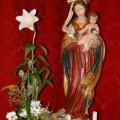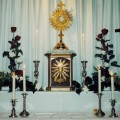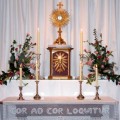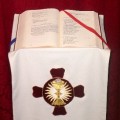Resurrection – Christ is risen indeed, and hath appeared to Simon!
 O blessed day of the Resurrection, which of old time was called the Queen of Festivals, and raised among Christians an anxious duty, nay contentious diligence duly to honour it! Blessed day, once only passed in sorrow, when the Lord actually rose, and the disciples believed not; but ever since a day of joy to the faith and love of the Church! In ancient times, Christians all over the world began it with a morning salutation. Each man said to his neighbour, “Christ is risen;” and his neighbour answered him, “Christ is risen indeed, and hath appeared unto Simon.”
O blessed day of the Resurrection, which of old time was called the Queen of Festivals, and raised among Christians an anxious duty, nay contentious diligence duly to honour it! Blessed day, once only passed in sorrow, when the Lord actually rose, and the disciples believed not; but ever since a day of joy to the faith and love of the Church! In ancient times, Christians all over the world began it with a morning salutation. Each man said to his neighbour, “Christ is risen;” and his neighbour answered him, “Christ is risen indeed, and hath appeared unto Simon.”


 This is why the Blessed Virgin is called Powerful-nay, sometimes, All-powerful, because she has, more than anyone else, more than all Angels and Saints, this great, prevailing gift of prayer. No one has access to the Almighty as His Mother has; none has merit such as hers. Her Son will deny her nothing that she asks; and herein lies her power.
This is why the Blessed Virgin is called Powerful-nay, sometimes, All-powerful, because she has, more than anyone else, more than all Angels and Saints, this great, prevailing gift of prayer. No one has access to the Almighty as His Mother has; none has merit such as hers. Her Son will deny her nothing that she asks; and herein lies her power. 


 Pope John Paul II in the Apostolic letter Tertio millenio adveniente invited us to “a renewed appreciation of the theological virtue of hope … The basic attitude of hope, on the one hand encourages the Christian not to lose sight of the final goal which gives meaning and value to life, and on the other, offers solid and profound reasons for a daily commitment to transform reality in order to make it correspond to Gods plan” (n. 46).
Pope John Paul II in the Apostolic letter Tertio millenio adveniente invited us to “a renewed appreciation of the theological virtue of hope … The basic attitude of hope, on the one hand encourages the Christian not to lose sight of the final goal which gives meaning and value to life, and on the other, offers solid and profound reasons for a daily commitment to transform reality in order to make it correspond to Gods plan” (n. 46). Nearly two hundred years ago, John Henry Newman was born in London, the son of a banker and the first of six children. That this event would be celebrated two hundred years later could be known only by Divine Providence, Who ordained the day of birth itself. As a young man, it was Newman’s custom, especially on his birthday, to look back at the past, not in a purely human way, with only regrets and joys, but in the light of Divine Providence, and to write what he called his “birthday account”.
Nearly two hundred years ago, John Henry Newman was born in London, the son of a banker and the first of six children. That this event would be celebrated two hundred years later could be known only by Divine Providence, Who ordained the day of birth itself. As a young man, it was Newman’s custom, especially on his birthday, to look back at the past, not in a purely human way, with only regrets and joys, but in the light of Divine Providence, and to write what he called his “birthday account”.